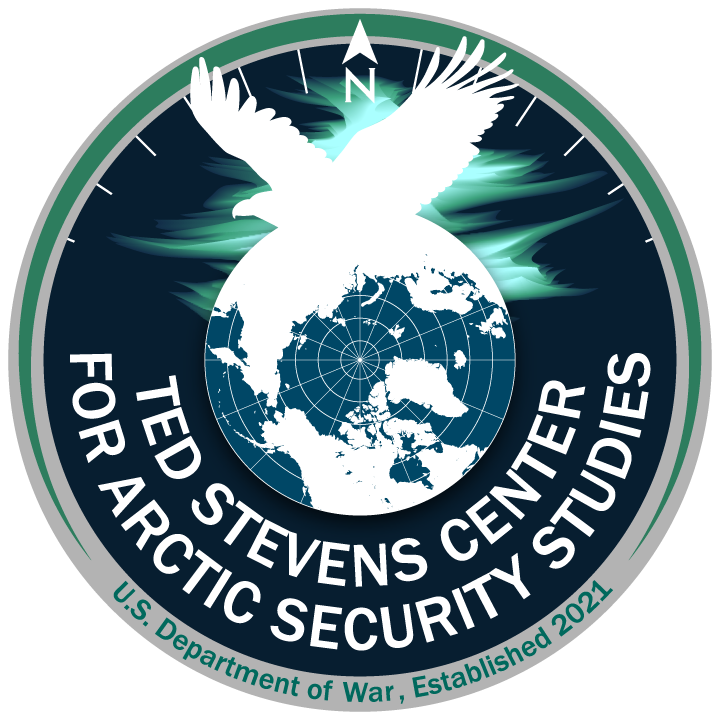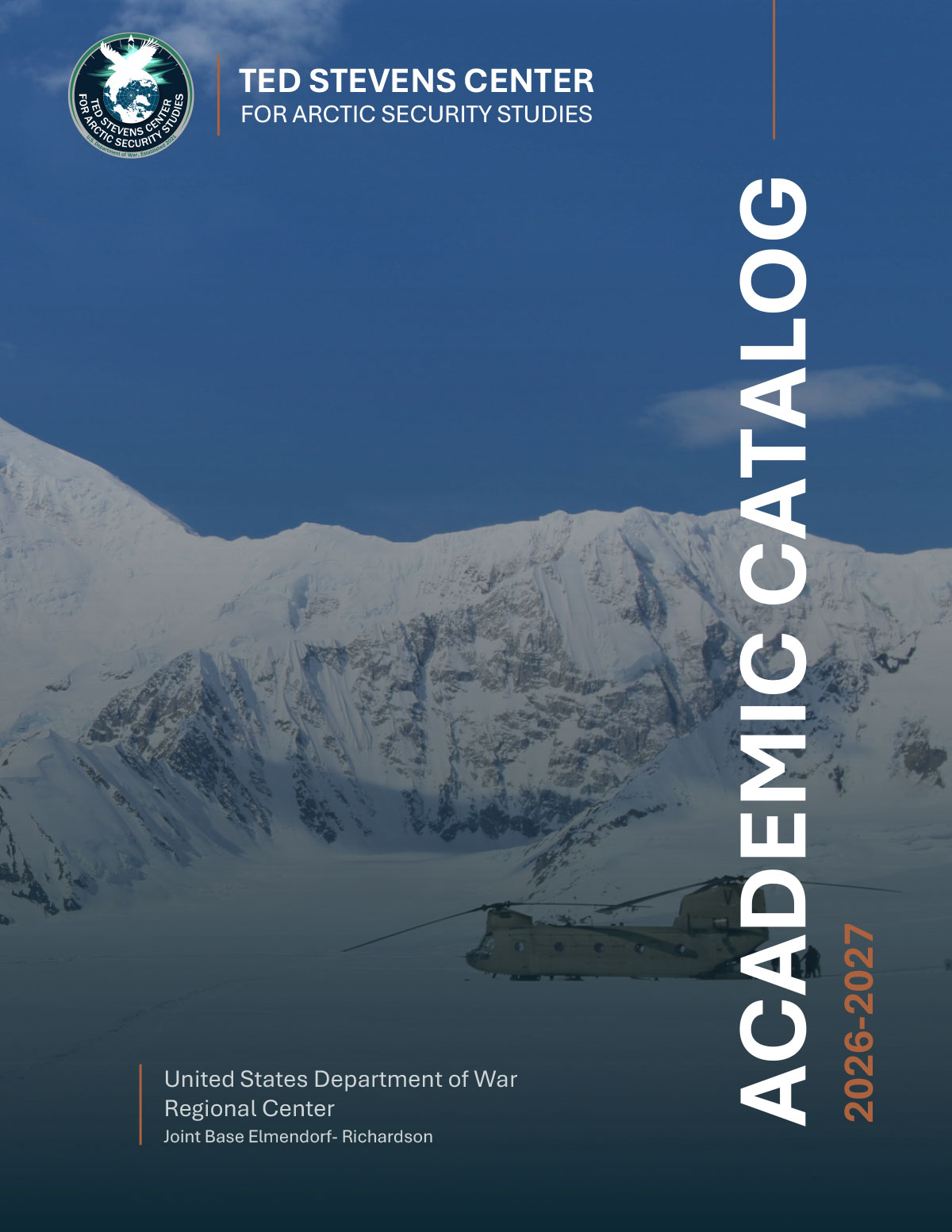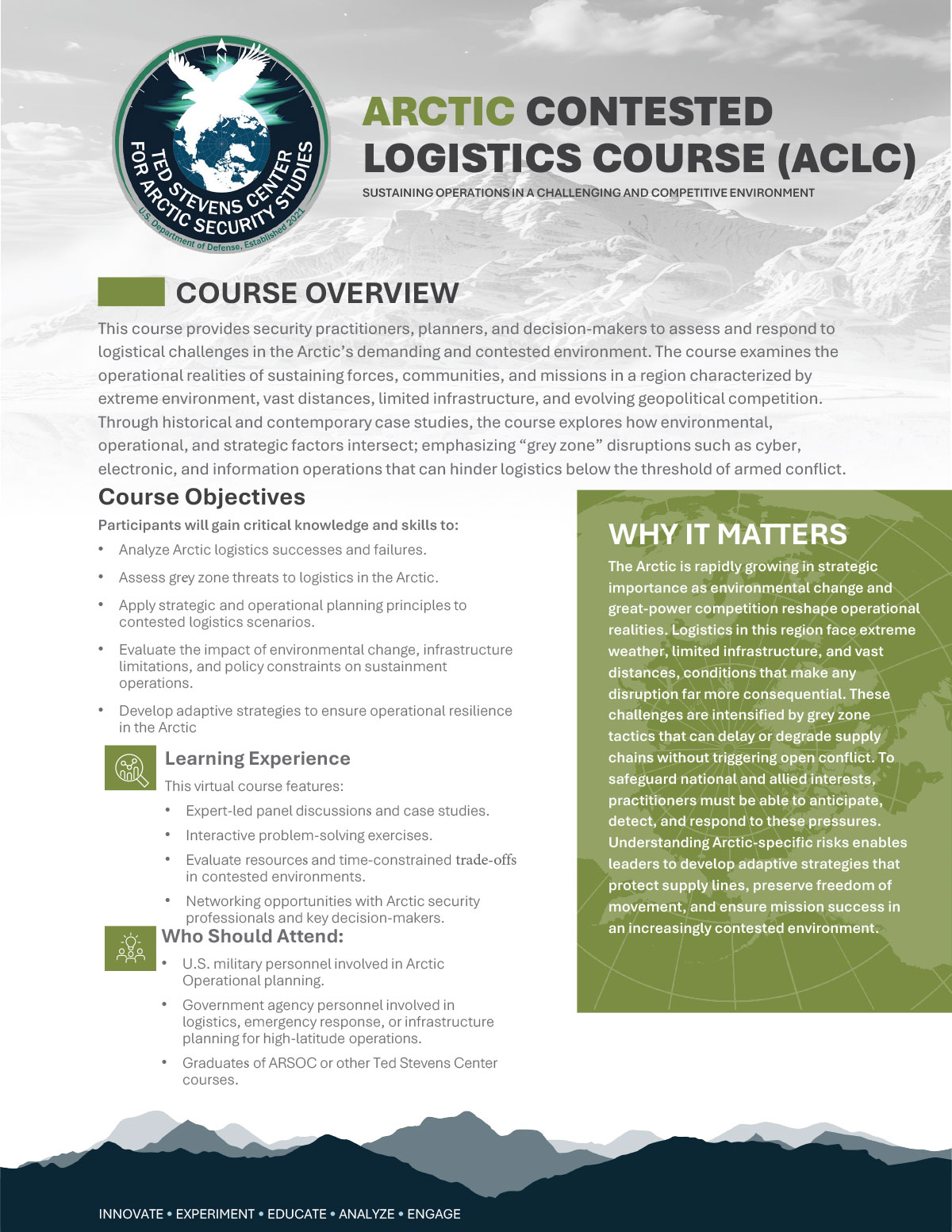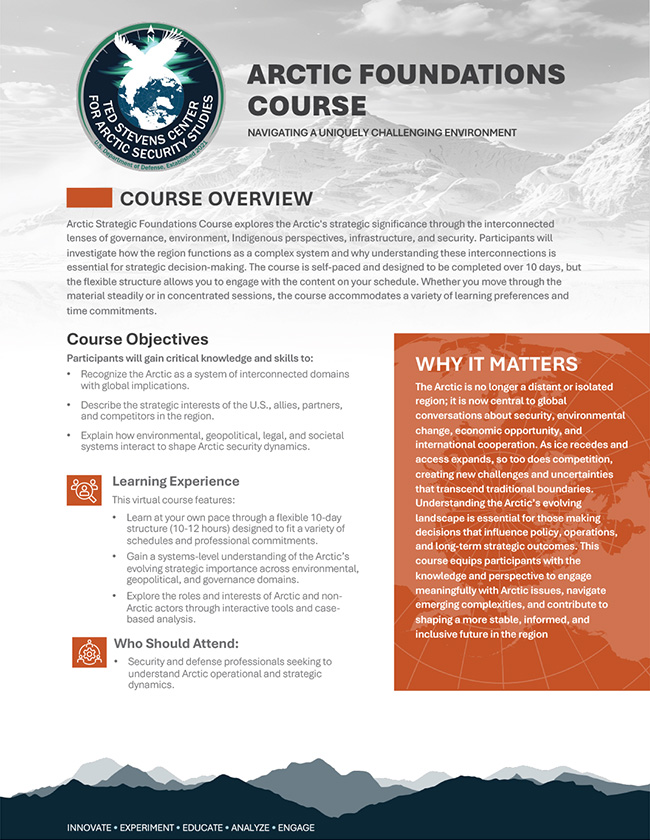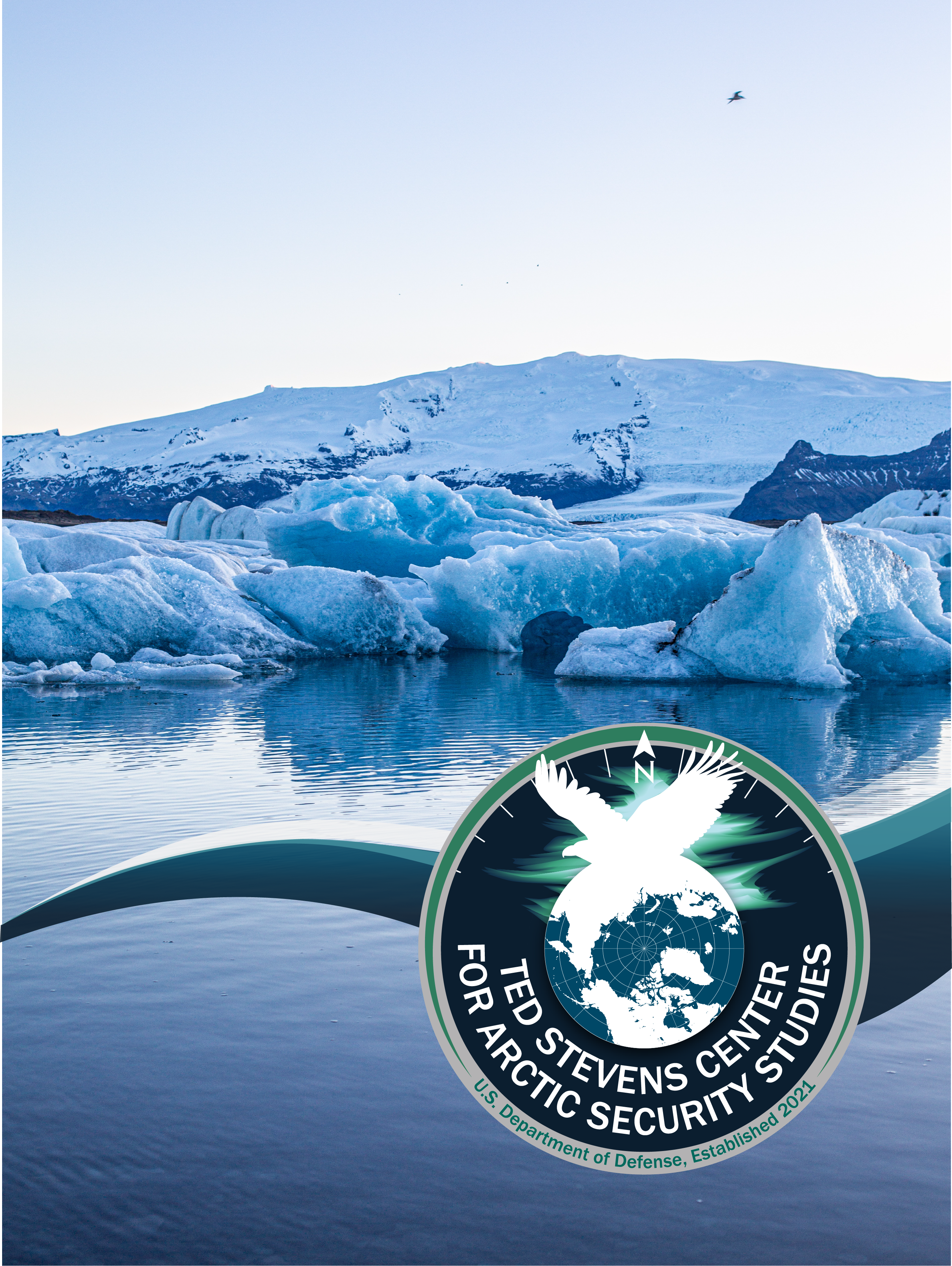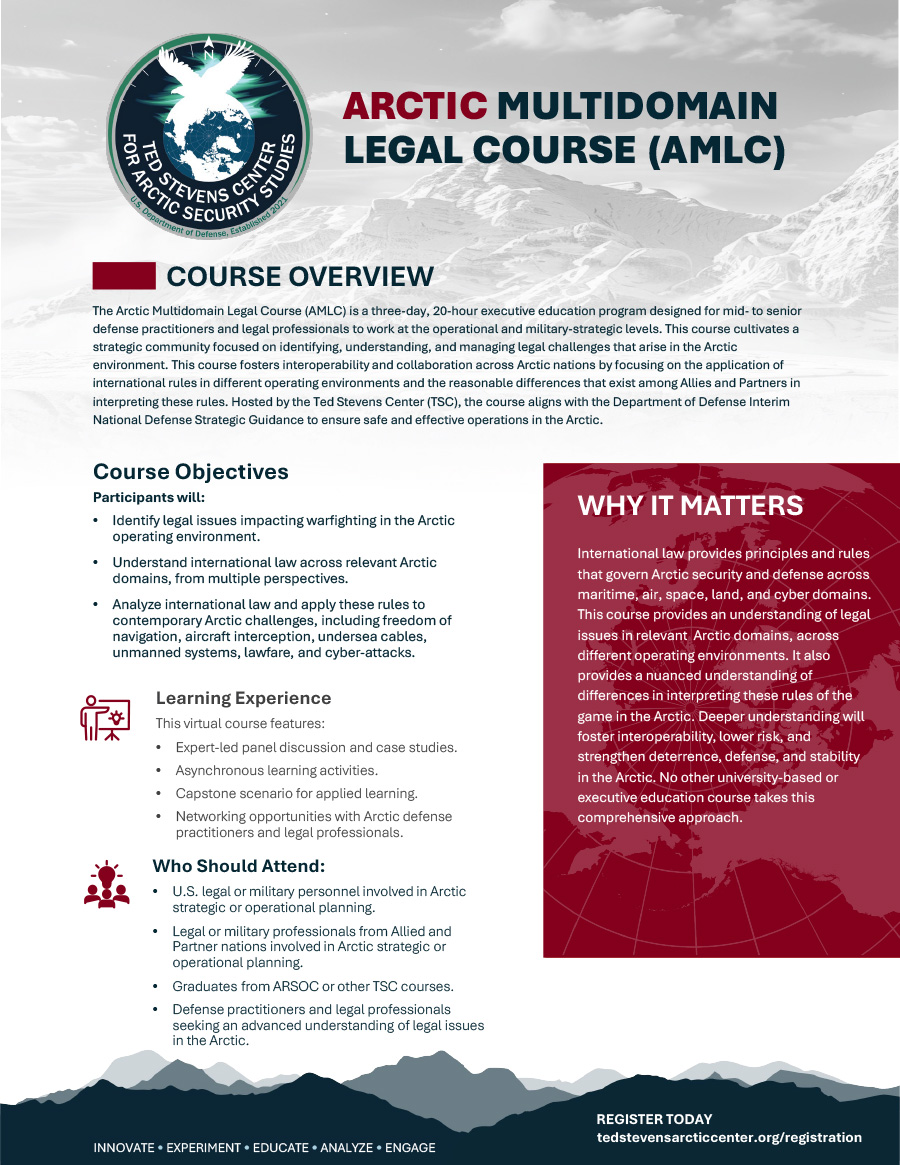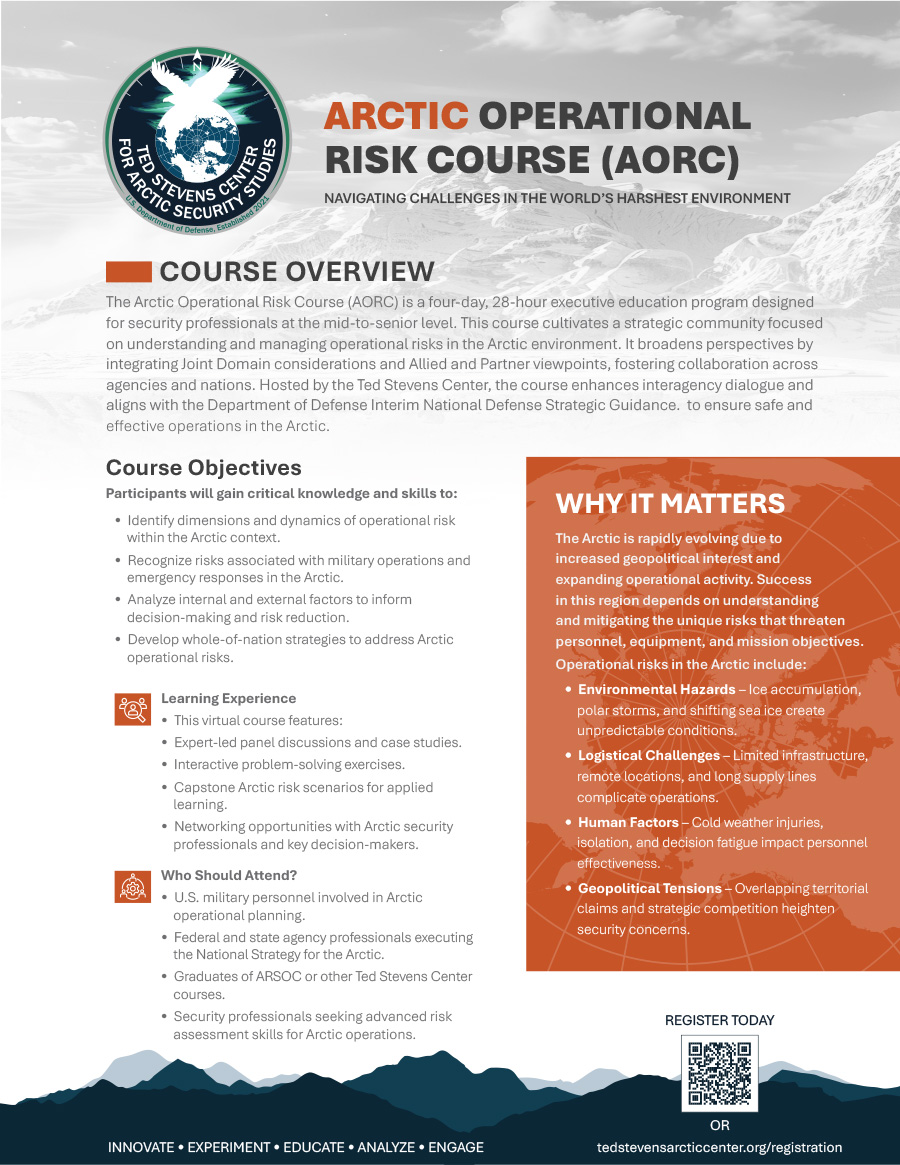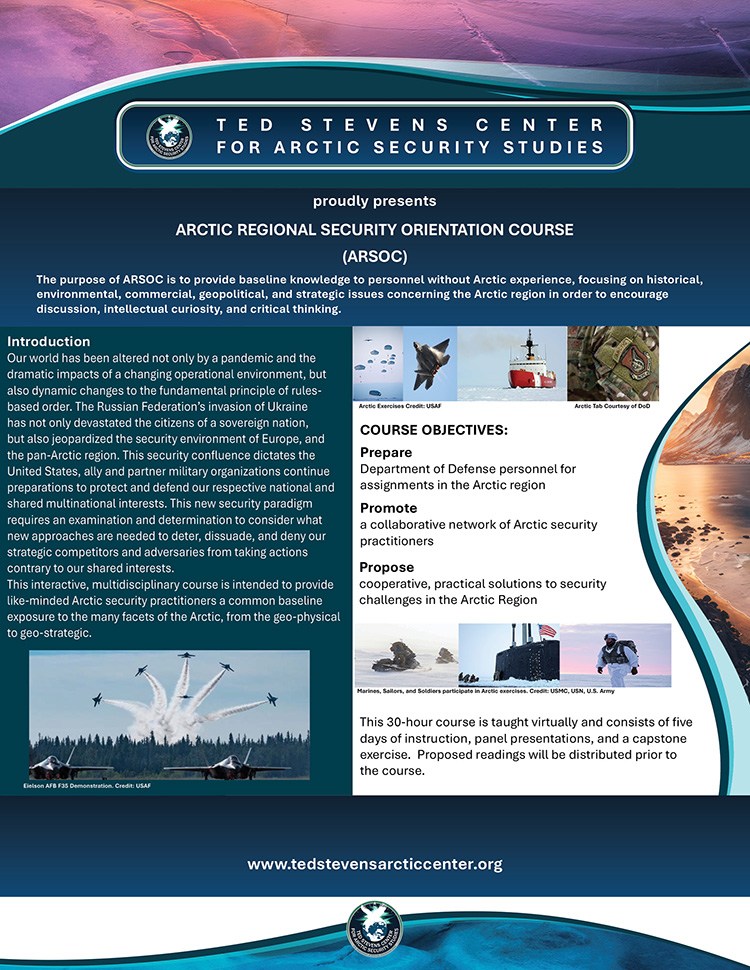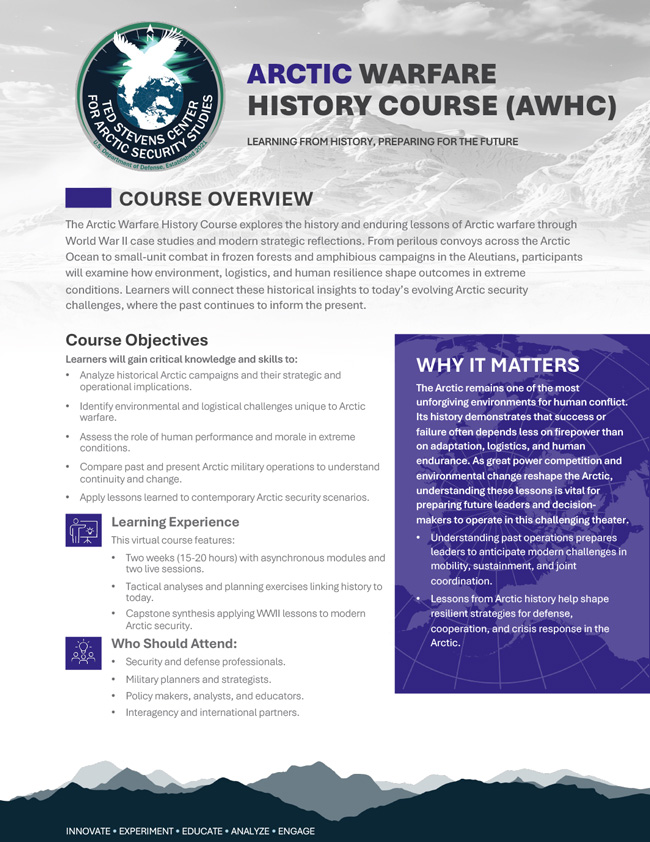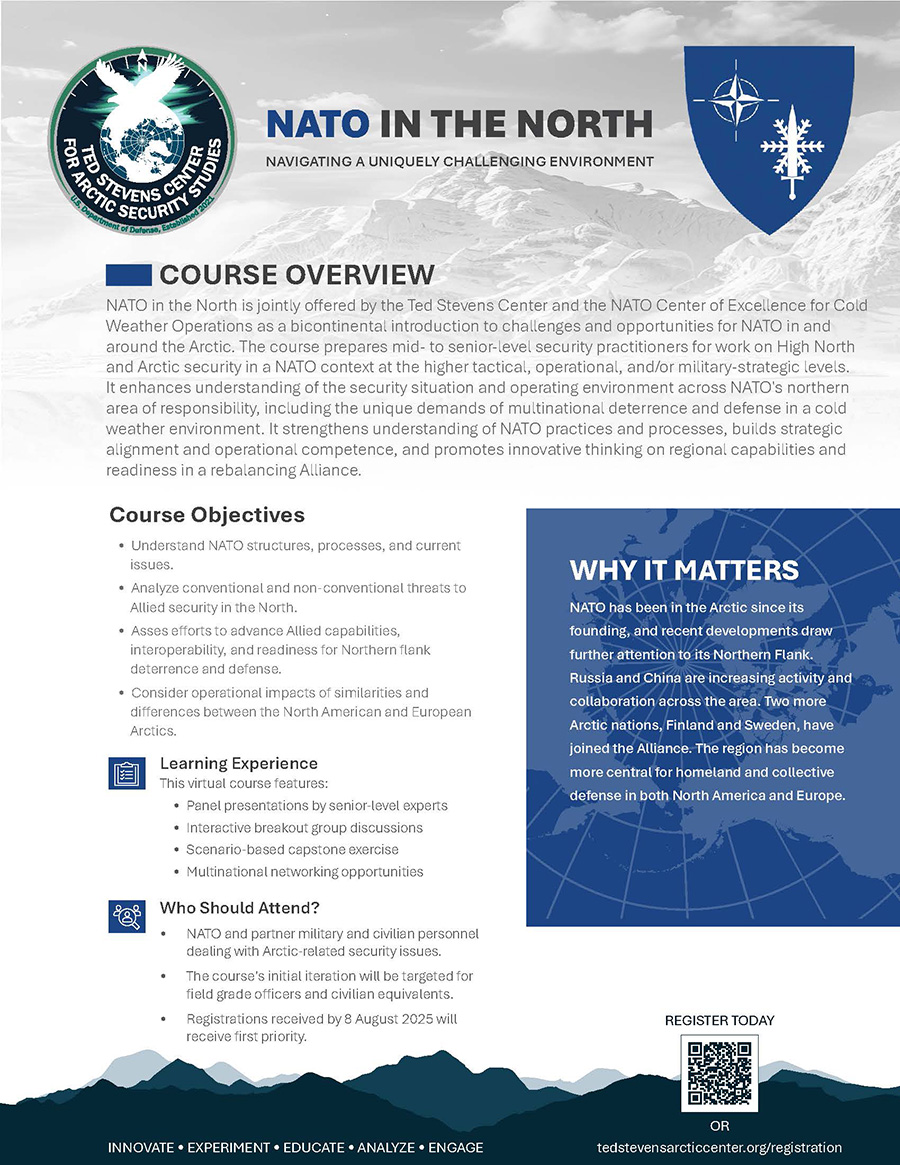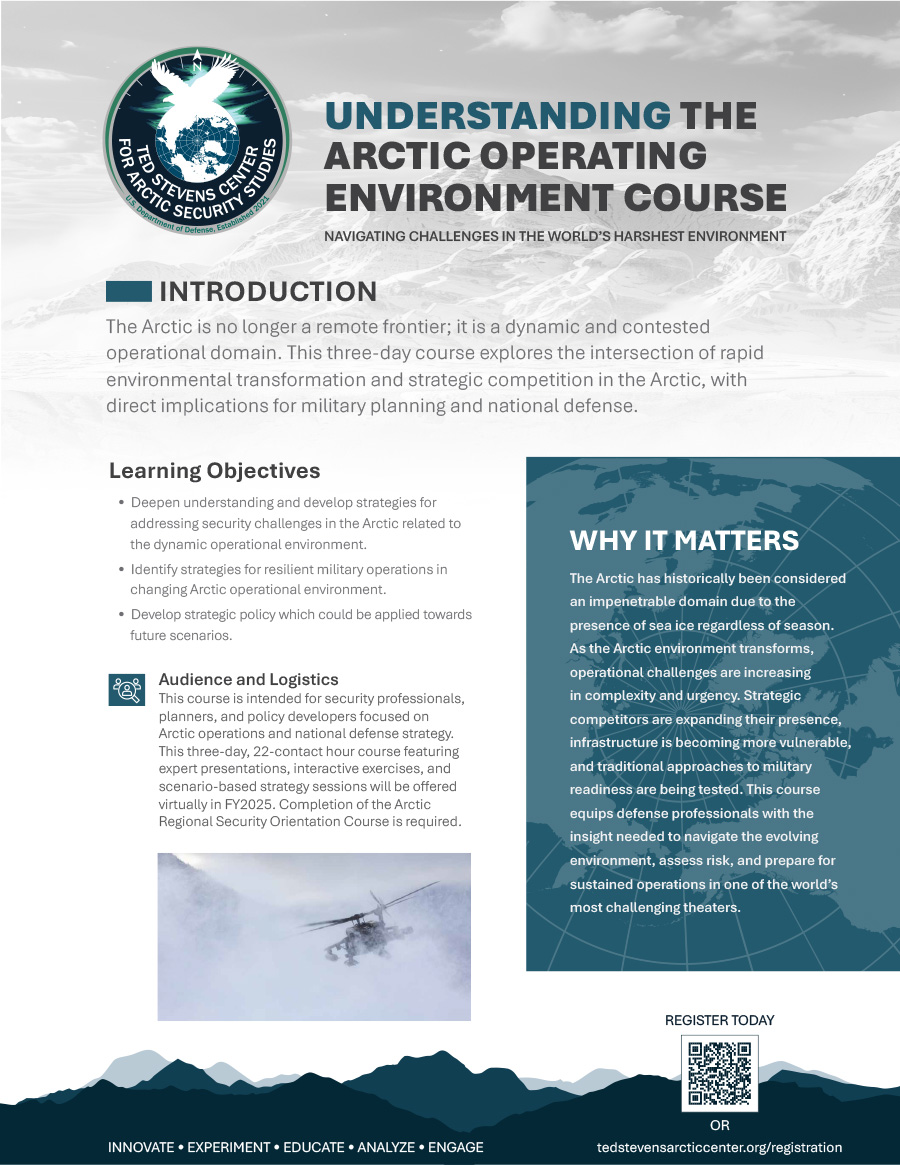Courses & Seminars
Consistent with the methodology of the established DOW RCs, the TSC School for Arctic Security Studies has a number of Arctic-Security focused seminars (ranging from approximately 4 to 60 hours of classroom instruction and leveraging virtual and in-person methodologies). Seminar and course offerings will be programmed and conducted from an overall wide variety of topics.

Arctic Contested Logistics Course (ACLC)
ACLC is a virtual 3-day, 21-hour course which seeks to examine the challenges in Arctic operations and sustained support, providing participants opportunities to examine the impacts infrastructure, operating conditions, distance and dark within an Arctic contested logistics environment. Participants will work to identify and anticipate risks and potential threats, and apply strategic and predictive planning principles to contested logistics scenarios. It is recommended that ARSOC (Arctic Regional Security Orientation Course) be taken as a prerequisite to this course.

Arctic Foundations Course
The Arctic Foundations Course is a fully asynchronous, self-paced program conducted over nine days (Dec. 15–23) with an estimated 10–12 instructional hours. Throughout the course, participants will develop the ability to recognize the Arctic as a system of interconnected domains with global implications, describe the strategic interests of the United States, allies, partners, and competitors in the region, and explain how environmental, geopolitical, legal, and societal systems interact to shape Arctic security dynamics.

Arctic Foundations Course dates:
Arctic Lawfare and Strategic Competition Course (ALSCC)
ALSCC is a five-day, 35-hour course specifically addresses how state and non-state actors use law as an instrument of warfare (lawfare) in the Arctic region. As the Arctic security environment evolves, competitors increasingly leverage legal mechanisms, territorial claims, and institutional frameworks as tools to advance their strategic interests while potentially constraining U.S. and allied operations. The course examines how lawfare manifests in the Arctic through extended continental shelf claims, disputed maritime passages, scientific research rights, and strategic infrastructure development. Particular attention is given to how Russia and China employ legal strategies to establish advantageous positions in the Arctic, and how security practitioners can recognize and respond to such approaches while maintaining U.S. interests and supporting the rules-based international order.

Click on the date to register for ALSCC
26-01 ALSCC 31 August – 4 September 2026
Arctic Multi-Domain Legal Course (AMLC)
AMLC is a three-day, 20-hour course that examines the most relevant Arctic legal frameworks, instruments, and concepts in relevant domains from U.S. and Allied perspectives. It situates the discussion in the context of current challenges, including freedom of navigation, aircraft interception, search and rescue, undersea cables, unmanned systems, lawfare, and cyber attacks. This course prepares mid- to senior-level security practitioners and legal professionals for work at the operational and military-strategic levels. Deeper understanding and enhanced knowledge will help to integrate operations, lower risk, and add to deterrence, defense, and stability in the Arctic. There is no other executive education course offered in the United States or among Arctic allies and partners that takes this comprehensive approach.

Click on the date to register for AMLC
26-01 AMLC 10-12 February
26-02 AMLC 5-7 May 2026
27-01 AMLC 17-19 November 2026
27-02 AMLC 4-6 May 2027
Arctic Operational Risk Course (AORC)
This five-day, 35-contact hour executive education course examines the complex operational risks inherent in Arctic security activities across all domains. It focuses on how practitioners can assess, mitigate, and manage risks unique to the Arctic’s challenging environment, characterized by extreme weather conditions, limited infrastructure, and constrained transportation networks. The curriculum incorporates local and place-based knowledge to enhance risk assessment and decision-making capabilities.

Click on the date to register for AORC
AORC 26-01 13-17 July 2026
Arctic Regional Security Orientation Course (ARSOC)
ARSOC is a five-day, 35-hour, virtually presented (at the present time) executive education course designed as an Arctic fundamental program for U.S. and Allied & Partner nation’s mid- to senior-career security practitioners. The course supports and creates communities of interest to provide opportunities for personnel to achieve a basic understanding of the current challenging Arctic security dilemmas and shape internal U.S. and international thinking. The course provides opportunities for participants to gain insight to inform for Arctic security analysis, survey practical solutions, and advance relationship building that supports the rules-based order in the Arctic.

Click on the date to register for ARSOC
26-02 ARSOC 9-13 March 2026
26-03 ARSOC 20-24 April 2026
26-04 ARSOC 17-21 August 2026
27-01 ARSOC 2-6 November 2026
27-02 ARSOC 8-12 February 2027
27-03 ARSOC 19-23 April 2027
27-04 ARSOC 16-20 August 2027
Arctic Strategic Competition Dynamics Course (ASCDC)
ASCDC is a three-day, 21-hour executive education course examines how strategic competition between major powers shapes Arctic security dynamics, with particular focus on the evolving nature of great power relations in the High North. The curriculum analyzes how China’s “pacing challenge” and Russia’s aggressive posture, manifested in their “no limits friendship,” affects Arctic stability through coordinated activities across multiple domains – including military operations, economic initiatives, technological development, and gray zone actions. Special attention is given to how this strategic partnership challenges established regional norms and institutions while creating new security dilemmas for Arctic states. The course explores how Allied and Partner responses, including NATO expansion, economic sanctions, and emerging security arrangements, are reshaping Arctic security architecture. It also examines how other Arctic-interested states navigate these dynamics through various approaches to alignment and nonalignment.

The Arctic Warfare History Course
The Arctic Warfare History Course is a two-week blended program consisting of approximately 20 instructional hours and two synchronous sessions. Throughout the course, participants will develop the ability to analyze historical Arctic campaigns and understand their strategic and operational implications. They will also examine the environmental and logistical challenges unique to Arctic warfare, assess the importance of human performance and morale in extreme conditions, and compare past and present Arctic military operations to identify both continuity and change. By the end of the course, students will be able to apply lessons learned from historical examples to contemporary Arctic security scenarios.

Arctic Warfare History dates:
NATO in the North Course (N2C)
N2C is a three-day, 12-hour course that examines NATO’s evolving role and presence in the Arctic region amid rapidly changing security dynamics. The curriculum analyzes how recent developments, including Russia’s war against Ukraine, increased Chinese regional activity, and the accession of Finland and Sweden to NATO, have fundamentally altered Arctic security considerations. The course explores how these changes affect NATO’s core tasks of deterrence and defense, crisis prevention and management, and cooperative security, while examining the growing importance of resilience in Arctic operations.

Click on the date to register for N2C
26-01 N2C 7-9 April 2026
26-02 N2C 8-10 September 2026
27-01 N2C 23-25 March 2027
Transatlantic Arctic Futures Course (TAFC)
TAFC is a three-day, 21-hour executive education course that examines potential trajectories of Arctic change through 2035, focusing on disruptive shifts across multiple domains that will shape transatlantic security relationships. The curriculum analyzes how converging factors – including dynamic operational environments, technological advancement, resource development, changing maritime access, and evolving geopolitical dynamics – may fundamentally alter Arctic security considerations. Using scenario-based analysis, participants explore how these transformative changes could affect North American and European security interests, partnerships, and operations in the High North. The course emphasizes practical approaches to building resilient transatlantic relationships that can adapt to multiple possible futures while maintaining regional security and stability.

Understanding the Arctic Operating Environment Course (UAOEC)
UAOEC is a three-day, 22-hour executive education course specifically oriented to support Arctic security and defense practitioners in better understanding the aspects of the dynamic operational environment in and across the Arctic region. This course examines the physical and geopolitical ramifications across the Arctic region. It also describes the impact of the operational environment on Arctic resources and its effects on the political balance in the Arctic.

Having Trouble Registering?
If you’re experiencing issues signing up for a course, reference the document linked below.
